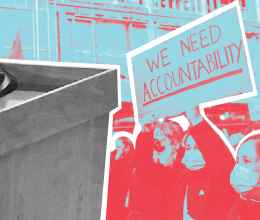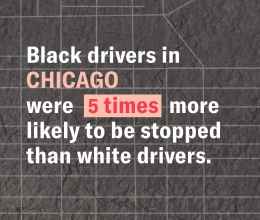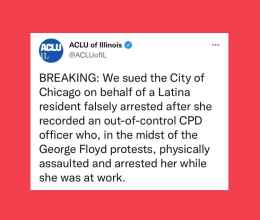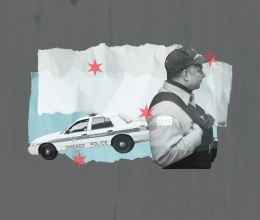
In a significant step, building on a two-decade long effort to combat racial bias in policing throughout Illinois, Governor JB Pritzker today signed a measure into law that makes permanent the collection and analysis of data about every police stop in the state. The Illinois Traffic and Pedestrian Stop Study Act – first signed into law in July of 2003 – is now permanent after the Governor signed House Bill 1613.
The practice of collecting basic demographic data about all traffic stops (later expanded to include pedestrian stops as well) was championed in the Illinois General Assembly by then-State Senator Barack Obama. As President of the United States, Mr. Obama repeatedly pointed to the Illinois practice as a means of measuring police conduct and building confidence between the police and the communities served by law enforcement.
“Illinois has been a model for other states in using data to understand and combat racial bias in policing,” said Rachel Murphy, staff attorney with the ACLU of Illinois. “Making the collection and analysis of this data permanent continues that role for Illinois and allows local communities to further build on their efforts to enhance trust and confidence between police and community members.”
The measure signed today by Governor Pritzker (House Bill 1613) was sponsored in the Senate by Senator Elgie Sims and in the House by Representative Justin Slaughter. The Governor’s action removes a provision that would have ended the collection of the data on July 1st, instead making the practice permanent in the State of Illinois.
Data about traffic stops was first collected across Illinois in 2004, following passage of the original act in 2003. The passage was hard-won, with then-Senator Obama and other legislative leaders advocating over several years before winning final approval. The measure was later expanded to include pedestrian stops and has been renewed regularly since that time.
Under the measure, police in Illinois are required to collect this information whenever they stop someone. This data collected includes the driver’s race, why the driver was stopped, whether a search was conducted, whether contraband was found, and the outcome of the stop (e.g., a citation). More than 900 law enforcement agencies across the state collect and report data, and the Illinois Department of Transportation (“IDOT”) makes it publicly available annually. Law enforcement supervisors and community leaders often have viewed the data as a critical tool for conversation to explore trends and patterns in policing.
The data can be striking. In a report issued earlier this year looking at data for 2015-2017, the ACLU found that Illinois law enforcement officers made nearly 6.5 million traffic stops and performed more than 283,000 searches. Looking at data reported by the police, the ACLU was able to conclude that police statewide stop Black and Latinx drivers at rates beyond their representation in the driving population and perform searches of Black and Latinx drivers at higher rates than white drivers.
“Illinois residents and law enforcement officials alike have been able to look at data about stops on our streets, roads, and highways to foster a dialogue about the experiences of police and community residents,” added Murphy. “Over time, we have seen communities use the data in order to correct disparities in enforcement. But there remains much work to do in our state – and across the nation. It was critical that data collection continued in Illinois so that the process of conversation and reform can continue.”
The measure signed today is effective immediately.



